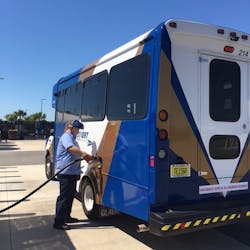When switching your fleet to a fuel other than gasoline or diesel, a big concern is determining a fueling strategy. With propane autogas, it’s easy. Infrastructure is simple to install, and the fuel is abundant.
Agencies have three choices on how to fill up their propane autogas transit vehicles — private stations, public stations and onsite fueling services.
Tip 1: Know Your Fueling Options
Because transit agency vehicles usually return to a central point at the end of each day, an onsite propane station can easily take care of your fueling needs. Depending on storage necessity, longevity and available space, there are underground storage tanks for longer-term use or aboveground skids that can be replaced or removed. Look for a local fuel supplier to install low or no-cost propane infrastructure. These propane providers specialize in helping fleets choose the right fueling option based on your fleet size, routes, budget and facility space.
For example, in Fort Myers, Florida, LeeTran opted for an onsite fueling station with a 3,900-gallon propane tank. Trained mechanics fuel the agency’s 20 ROUSH CleanTech Ford E-450 paratransit buses. For Flint Mass Transportation Authority’s fleet of over 100 paratransit buses and 16 Blue Bird Vision transit buses, the MTA built six propane fuel stations. That way, its drivers are rarely more than 15 miles from a fueling facility.
A second option is to contract with a propane supplier to perform onsite propane autogas fueling services. The propane supplier comes to your location and fuels from their bobtail truck.
Lastly, for agencies with limited space, public stations can be the solution. There are already thousands of propane stations across the United States. To find stations near you, visit the Alternative Fuels Data Center.
Tip 2: Consider the Cost
According to the Alternative Fuels Data Center, the upfront cost of propane infrastructure is very affordable. In fact, propane autogas fueling infrastructure costs less than any other fueling station — conventional or alternative. Your agency may only be responsible for installing permanent equipment like a concrete pad or electricity line for the fuel station. The other costs (that could include paying for a tank, pump and dispensing equipment) may be picked up or offered at low cost if you sign a fueling contract with a propane provider.
Tip 3: Evaluate Propane Fuel & Equipment Providers
As part of your strategy, contact propane fuel system providers along with propane fuel providers. They can answer your questions about equipment, installation and fuel costs. You may even already have a propane provider for your forklifts or other equipment.
For instance, the city of Lake Charles, Louisiana, recently added two cutaway transit buses fueled by propane autogas. Committed to clean alternatives, the city already operated two trucks, four forklifts and 28 riding mowers fueled by propane.
With propane autogas, your employees can avoid the spills that result from diesel fueling as well as the resulting diesel odor on their clothes and hands. Unlike gasoline or diesel, propane autogas is part of a closed-loop system, meaning the fuel is never exposed to air and won’t spill. Plus, fueling is quick; a propane autogas vehicle fuels at a similar rate to diesel.
Across the nation, dozens of agencies reduce emissions and costs by operating propane autogas transit shuttles and buses. By following these tips, your transition to propane autogas vehicles can run smoothly, too.
Todd Mouw is president of ROUSH CleanTech, an industry leader of alternative fuel vehicle technology.
About the Author

Todd Mouw
Executive Vice President of Sales and Marketing
Todd Mouw is executive vice president of sales and marketing for ROUSH CleanTech, an industry leader of alternative fuel vehicle technology. Mouw has served as president of the NTEA Green Truck Association.
